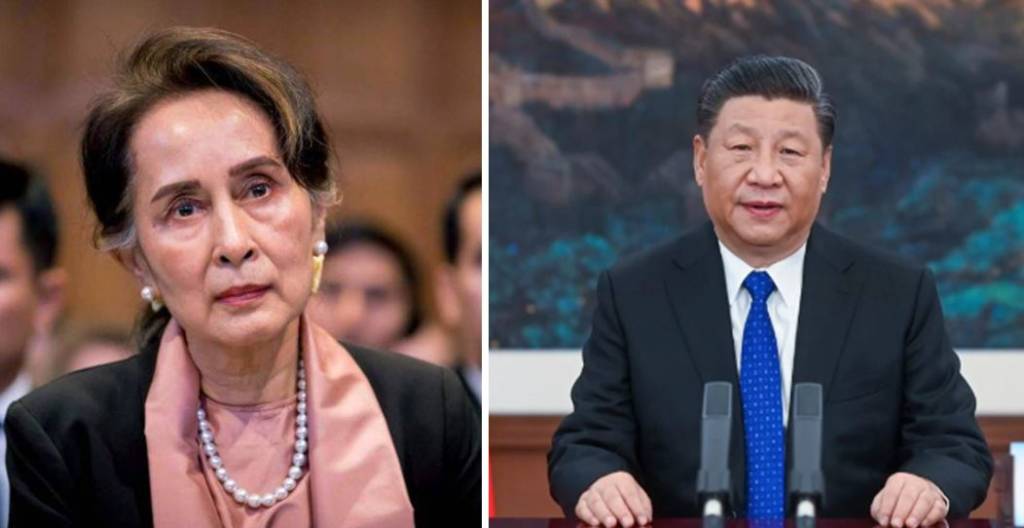China is playing some dangerous games in Myanmar. The Yunnan-based China China Ordnance Industries Group Corporation Limited (NORINCO) is accused of supplying arms and logistics to Burmese insurgents groups like the Arakan Army fomenting unrest within Myanmar, especially in the coastal province of Rakhine. But the state counsellor of Myanmar, Aung San Suu Kyi is nowhere to be seen.
The Burmese State Counsellor and de facto head of the government of Myanmar, is today probably the most hated person within the human rights groups. Aung San Suu Kyi had spent approximately 15 years between 1989 and 2010 under house arrest, and was a beacon of democracy.
She was seen as the one who fought for democracy in a military rule. In the course of time, Ms Suu Kyi became the face of democracy and liberalism. She was bestowed with the Nobel Peace Prize for her pro-democracy crusade in Myanmar.
But things changed and changed pretty quickly for Myanmar’s State Counsellor. She took over in 2016 and the Rohingya issue happened shortly after she assumed power.
The Rohingya exodus is an issue that is close to the heart of prejudiced human rights groups around the world. Aung Sang Suu Kyi remains popular within her country but has lost appeal as an international icon of democracy.
She has been accused of staying silent about the Buddhist monk, Ashin Wirathu whom the liberal international media accused of fanning communal sentiments and creating anti-Rohingya Muslim passions.
Aung San Suu Kyi is the civilian leader of Myanmar, while the Military junta still remains powerful. The Burmese military is its own boss, and the Burmese State Counsellor doesn’t exercise much influence over the military commanders who control the country’s security and police forces.
Nonetheless, Suu Kyi faces criticism for not reprimanding the commanders who oversaw the Rohingyas crackdown in 2017 after the Arakan Rohingya Salvation Army (ARSA), a terror group had claimed responsibility for attacking police and army posts.
There have been demands to take away Suu Kyi’s Nobel Peace Prize. Amnesty International itself has gone ahead with stripping her of its highest honour- the Ambassador of Conscience Award.
When the Rohingya matter reached the International Court of Justice at the Hague, Suu Kyi put up a brave face and went solo to defend her country. But the way Rohingya crisis unfolded has brought a lot of shame to Myanmar.
No longer the beacon of democracy, Aung San Suu Kyi has allowed herself to be sidelined. Banished by the liberal lobby, she has gone into a self-imposed exile and this is what China is capitalising upon.
China has many objectives to achieve out of Myanmar- creating unrest in India’s Northeast, blocking India’s way to Southeast Asia and more importantly entering the Indian Ocean itself.
India doesn’t want Myanmar to fall into China’s lap either, and therefore the country is becoming the centre of a great powerplay between the two Asian giants. Beijing is, however, playing dirty and to some extent also using the Rohingya crisis against Aung Sang Suu Kyi.
China’s gameplan is simple- fund the Arakan Army and other insurgent groups in Myanmar, thwart India’s ambitions of easy access to its own North-east and arm-twist Myanmar by using insurgency as an instrument of State policy.
Bangladesh also figures in China’s equations as Dhaka is disillusioned with Myanmar because the maximum burden of Rohingya pushout has fallen upon it.
Therefore, when Chinese elements deliver arms close to the coastal junction of Myanmar and Bangladesh, Bangladeshi troops are said to look the other way. They do not engage the Arakan Army insurgents and suppliers unlike India which co-operates in joint military strikes with Myanmar.
NORINCO, which is known to supply arms to both Burmese and Northeast insurgent groups, is also gearing up to sell arms to the Bangladesh Army. China wants to make a base in Bangladesh from which it can bolster insurgent groups in both India and Myanmar.
Things get further complicated when China decides to collaborate with the Arakan Army is concerning for India’s crucial $484 million Kaladan Multi-Modal transit project which seeks to connect India’s North East to Myanmar’s Sittwe seaport. The Sittwe seaport is located in the Rakhine province where the Arakan Army has a stronghold.
For China, keeping the Arakan Army (AA) happy is a strategic investment, because Beijing is building a deep seaport and a special economic zone in the Rakhine province.
Xi Jinping wants to push his flagship Belt and Road Initiative (BRI) in Myanmar. It envisions a China-Myanmar Economic Corridor (CMEC) on the lines of the China-Pakistan Economic Corridor (CMEC). But Myanmar doesn’t seem to be reciprocating warmly. So, China is using insurgency to extort Myanmar.
Burmese sovereignty is under attack from China. The country must weed out the insurgent groups. But it is only unfortunate that Aung is not speaking up.
It is only the Burmese Commander-in-Chief of the Myanmar Armed Forces, Min Aung Hlaing who has objected to China arming terrorist groups like Arakan Army (AA) and Arakan Rohingya Salvation Army (ARSA), and has sought global help. You will never see the Burmese State Counsellor speak about this, but she must.
Aung San Suu Kyi should come out of her self-imposed exile. She should realise that it is she who represents Myanmar on the world stage and only she can formally flag China’s dangerous games in her country.
